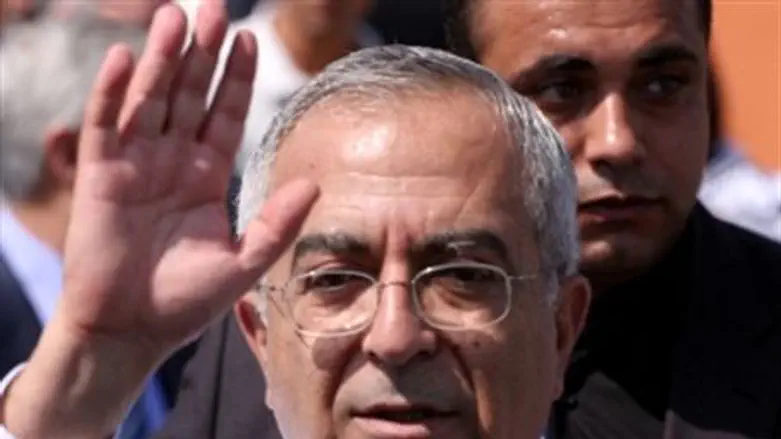
The Palestinian Authority’s Prime Minister, Salam Fayyad, said Saturday that his government would reduce expenses if donor countries fail to pay aid they pledged to the PA.
Fayyad reiterated in a conversation with the Bethlehem-based Ma’an news agency that the PA would face a serious financial situation if funding does not arrive as promised.
He added that the PA has been suffering an acute financial crisis for more than two years, and a report by the International Monetary Fund “brought nothing new.”
The IMF report he was referring to is one which was released on Saturday and which estimated a financing gap of about $500 million. The report was prepared for a donor meeting on aid to the PA in Brussels next week, Ma’an said.
The PA is relying on donor aid to cover its 2012 budget deficit projected to reach $1.1 billion. The IMF on Saturday urged donors to meet their aid pledges to the PA, warning that unless funding was forthcoming it would be forced to cut public wages and social benefits to address a deepening fiscal crisis.
The IMF said the PA economy had entered a “difficult phase”, Ma’an reported, with a severe liquidity crunch worsening since last year due to a drop in aid from Western backers and wealthy Gulf states and Israeli restrictions on trade.
Most of the aid to the PA comes from the United States, the European Union and Arab nations, allowing the Palestinian Authority to pay the salaries of public workers and benefits.
The U.S. cut off funding last year after PA Chairman Mahmoud Abbas made a unilateral bid for statehood recognition at the United Nations.
The IMF’s mission chief to the PA-controlled areas of Judea and Samaria and Gaza, Oussama Kanaan, said it would be very difficult for the Palestinian Authority to cover the 2012 financing gap without donors making good on existing pledges and providing additional aid.
He told Ma’an steady declines in foreign assistance had led to a large increase in domestic payment arrears of about $500 million to private businesses, and increased government debt to commercial banks to around $1.1 billion.
“The stock of indebtedness has increased to such an extent that the PA is no longer able to postpone payments to the private sector and to banks,” Kanaan said. “If money from the donors isn't forthcoming ... the only way it can cut expenditures is to cut wages or social benefits.”
He added, “The deficit is very large and it cannot compensate anymore for the shortfall by accumulating debt because the private sector will not allow them and banks will not lend them much more.”
A recent World Bank report said the PA is undergoing a financial crisis and also admitted that it was primarily due to the lack of donor countries fulfilling their pledges to fork over billions of dollars to Ramallah.
Fayyad warned several months ago that the Palestinian Authority may soon fail financially and cease to exist, but he blamed that on Israel’s freeze of the transfer of tax revenues it collects for the PA.
Israel, which transfers some $100 million in tax payments to the PA every month, decided to halt the transfer of taxes to the PA as part of a round of sanctions against the entity, following its ascension as a 'full-member state' to UNESCO.
Israel’s Security Cabinet later approved the unfreezing of the tax revenues.
